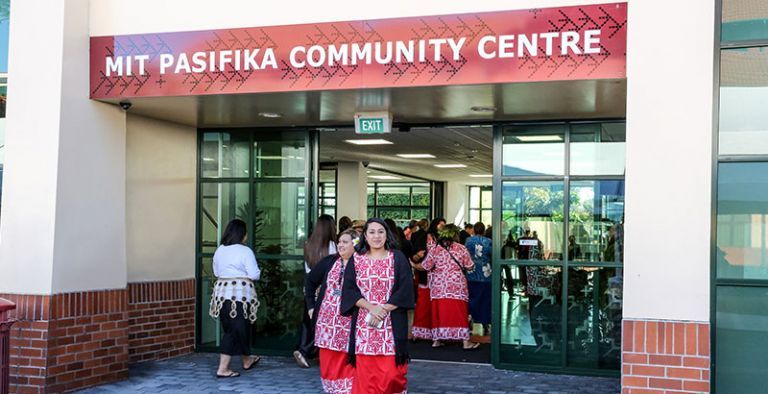

Photo/MIT/Unitec
Unitec-MIT merger promises gains for Pacific students amid fees, course concerns
The new Auckland-based vocational provider aims to better serve Pacific learners and local industries, but questions remain about the axing of Te Pūkenga.



New Pacific toolkit brings ancestral knowledge into Aotearoa classrooms





New Pacific toolkit brings ancestral knowledge into Aotearoa classrooms


A newly merged tertiary training institute claims it will improve outcomes for Pacific learners and strengthen its regional focus.
But education leaders and critics warn that moving away from a national provider may lead to course cuts, job losses, and increased costs for students.
The Manukau Institute of Technology (MIT) and Unitec, which have operated independently for over 50 years, will now become a single regional entity following the Government’s decision to disband Te Pūkenga, the national polytechnic body established in 2020.
Peseta Sam Lotu-Iiga, Executive Director of Unitec and MIT, says the new model will enable the merged entity to better serve local communities, particularly the Pacific learners who make up a significant proportion of students in South and West Auckland.
He assures that the restructuring will not immediately alter course offerings or student fees, with a transition plan already in effect and a governing council set to be appointed in the new year.
“With the change of government, there's a desire to move the decision-making from a centralised body ... to have local decisions made by local people, a focus on regional services in the region,” he tells Ala Vailala on Pacific Mornings.
Watch Peseta Sam Lotu-Iiga's full interview below.
“We have two Pacific teams, one at Unitec, one at MIT, and we've been working together for some time. When we go out to schools or to events like Polyfest, we do it as one team. That collaboration means better service delivery.
“What might change in the long term is a more focused suite of educational programmes, tailored to what our communities and industries actually need.”
Concerns about loss of equity and services
Labour’s education spokesperson, Willow-Jean Prime, says the changes are “a devastating backwards step” for vocational education, particularly in the regions.
Prime is concerned that some regional institutions may struggle to survive without the national support structure, with polytechnics in Taranaki, the West Coast, Wellington, and Northland facing possible closure.

MIT has a dedicated Pasifika Community Centre whih offers dedicated programmes and support services. Photo/MIT
“This is going to have a huge impact in our regions and for our tauira (students), Māori, Pasifika and rural learners right across the country,” she says.
“Under this model, they are not financially viable. That’s why we created Te Pūkenga, so vocational training would be viable across the country.”
She is also concerned over the possibility of campus closures and course cuts, suggesting that institutions may need to increase fees or sell land to remain operational.
Sandra Grey, head of the Tertiary Education Union, fears these changes will exacerbate the urban-rural learning divide.
"The only courses [that] are surviving are those that can get lots and lots and lots of students,” she tells Radio New Zealand, highlighting that courses relevant to community needs, such as agriculture in dairy-farming regions, are at risk.
Watch Willow-Jean Prime's full interview below.
Lotu-Iiga acknowledges the financial challenges, but says Unitec-MIT is on a positive path. He is confident that Pacific learners will continue to receive support.
“One of the goals that we need to achieve is around financial sustainability ... that means some hard decisions will and have to be made. But we’re leaning right into that.
“We’ve got a track record of delivering to Pacific peoples locally. Our campuses are where our people live, work and study. That proximity matters.”
Focus on equity still vital
While the coalition Government has distanced itself from terms like “equity” and “equitable outcomes”, Lotu-Iiga, a former Minister for Pacific Peoples, insists that these ideas remain central to their mission.
He says MIT and Unitec already support Pacific learners through small class sizes, a strong Pacific academic network, and a pastoral approach to teaching.
“It is in the legislation that we are about producing equitable outcomes. That means lifting Pacific, but also lifting other groups, disabled learners, migrant and refugee communities, and Māori under Te Tiriti.“Our Pacific learners see themselves reflected in our organisation. They’re supported by their whānau, and they succeed, especially in areas like nursing, where our Pacific students are doing better than other groups.”
Looking ahead, Lotu-Iiga says local leadership will foster closer industry alignment and stronger employment pathways for students.
“We’ve been meeting with civil contractors and other industry partners, who rely on us for their workforce. So this is not just about education, it’s about building a skilled workforce for Auckland and New Zealand.
“We’re playing a really important part in delivering better jobs and better lives for our people, especially Pacific families. We’ve done it before and we’ll keep doing it.”